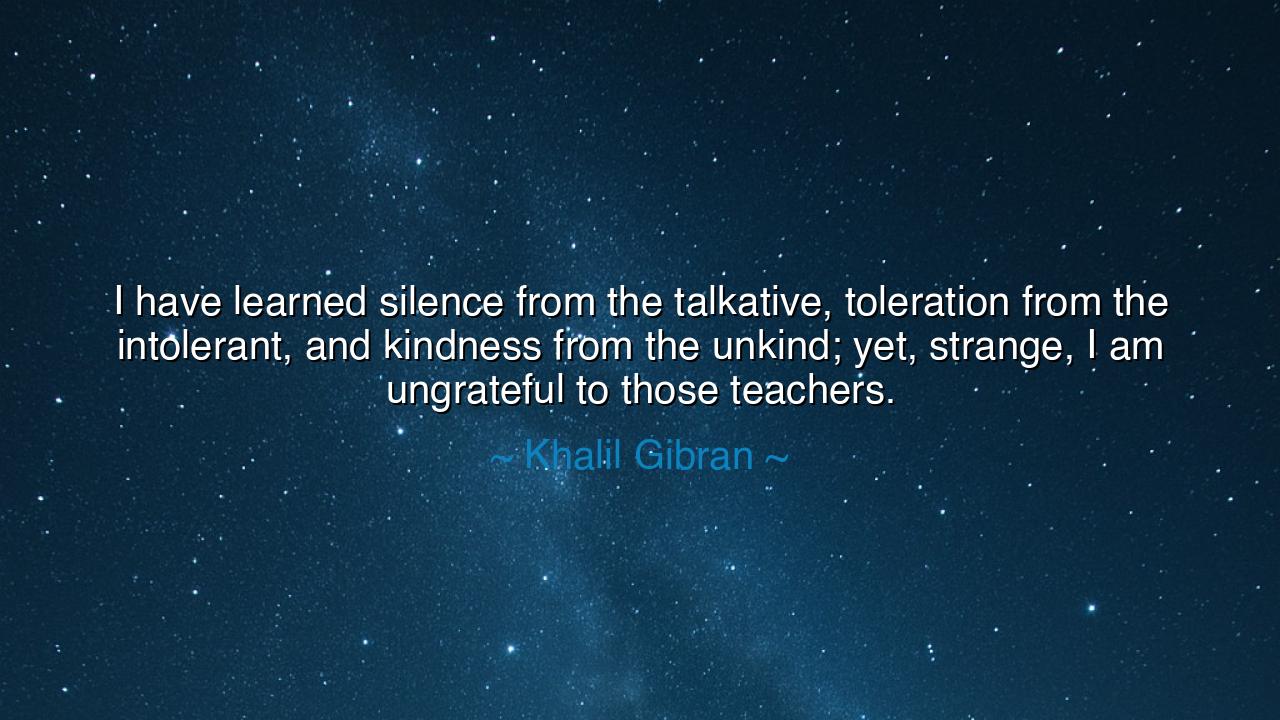
I have learned silence from the talkative, toleration from the
I have learned silence from the talkative, toleration from the intolerant, and kindness from the unkind; yet, strange, I am ungrateful to those teachers.






"I have learned silence from the talkative, toleration from the intolerant, and kindness from the unkind; yet, strange, I am ungrateful to those teachers." So wrote Khalil Gibran, the mystic poet of Lebanon, whose words carried the fragrance of the eternal East and the weight of timeless wisdom. In this saying, he reveals the paradox of life: that even from the harshest of men, even from the most bitter of encounters, there flows a hidden wisdom. Yet, as he admits, we rarely offer gratitude to these unwilling teachers, for they gave their lessons through pain rather than through love.
The meaning is this: every soul we meet becomes a mirror, whether it shows us beauty or ugliness. From the talkative, we learn the worth of silence, for in their endless noise we see the poverty of speech untempered by thought. From the intolerant, we come to value patience, for their rigid cruelty shows us the chains of narrowness. From the unkind, we learn the sweetness of mercy, for their coldness makes us thirst for warmth. Thus, life uses even the darkest stones to carve out wisdom in our hearts. The teachers we despise are often the ones who prepare us most to walk the higher path.
Consider the story of Nelson Mandela, who endured twenty-seven years of imprisonment under the hands of a government ruled by intolerance and cruelty. His jailers gave him not kindness but scorn, not freedom but chains. Yet, within that crucible, he learned the meaning of true forgiveness. From the intolerant, he learned the greatness of toleration. From the unkind, he learned the strength of kindness. And though he did not thank his captors, the lessons he drew from their oppression allowed him to emerge not bitter, but radiant, a healer of nations.
This quote also reminds us of the strange irony of the soul: that we often resent those who shape us most. We honor our gentle teachers, but scorn the harsh ones, forgetting that without them our wisdom would remain incomplete. Should we be grateful to those who hurt us? Perhaps not in the manner of friendship or affection, but in the quiet recognition that their shadows pushed us toward the light. Life itself is a forge, and it uses both fire and hammer to shape the steel of our spirit.
Yet beware, for there lies a danger: to let bitterness consume us when faced with such teachers. If we only see the wound, we miss the wisdom. If we only remember the pain, we forfeit the strength it offered us. The ancients knew this truth: that the enemy may sharpen the sword of the soul more than the friend ever could. Therefore, the wise heart transforms poison into medicine, insult into patience, cruelty into compassion. This is the alchemy of the spirit, the secret fire that turns suffering into gold.
What then is the lesson? It is to look within every trial for its hidden gift. Do not curse the talkative without first remembering that they taught you the value of silence. Do not despise the intolerant without seeing how they trained your heart in patience. Do not hate the unkind without realizing that their cruelty made your kindness shine brighter. Life sends no experience without a lesson, and no soul crosses your path without leaving behind a fragment of wisdom.
Practically, this means you must cultivate the discipline of reflection. When hurt, pause and ask: What is life teaching me through this pain? When angered, ask: What strength is being forged in me now? Write down the lessons, for memory fades, but written words endure. And while you need not embrace those who wounded you, you can honor the wisdom their actions revealed. This is not gratitude to the cruel, but gratitude to life itself, which uses even cruelty to shape your greatness.
So remember the words of Khalil Gibran, and pass them on: the world itself is a school, and every soul, whether noble or vile, becomes a teacher. If you walk with open eyes, you will gather wisdom from all directions, and your heart will be rich with treasures mined even from the stones of suffering. And when your children ask you how to deal with the unkind, you may tell them: “From them we learn kindness; from them we rise higher than they could ever reach.”






AAdministratorAdministrator
Welcome, honored guests. Please leave a comment, we will respond soon